Fremont College: Motion to Suppress Evidence in Criminal Law
VerifiedAdded on 2023/03/21
|6
|1049
|93
AI Summary
This assignment presents a motion to suppress evidence, arguing that the search and seizure conducted by officers were unlawful due to the absence of a warrant and unreasonable circumstances. The defendant, Mr. Dexter Dirtbag, asserts his right to privacy in the motel room and challenges the admissibility of evidence, including a pistol, obtained during the warrantless search. The motion further contends that the officers failed to read Miranda warnings to Mr. Dirtbag while he was in custody, rendering his statements inadmissible. The assignment references relevant legal precedents, such as People v. Hughston and Wong Sun v. U.S., to support the arguments for suppressing the evidence and protecting the defendant's constitutional rights. The defense asserts there were no exigent circumstances or lawful arrest to justify the warrantless search and that the officers acted coercively during the interrogation, thereby violating Mr. Dirtbag’s rights.
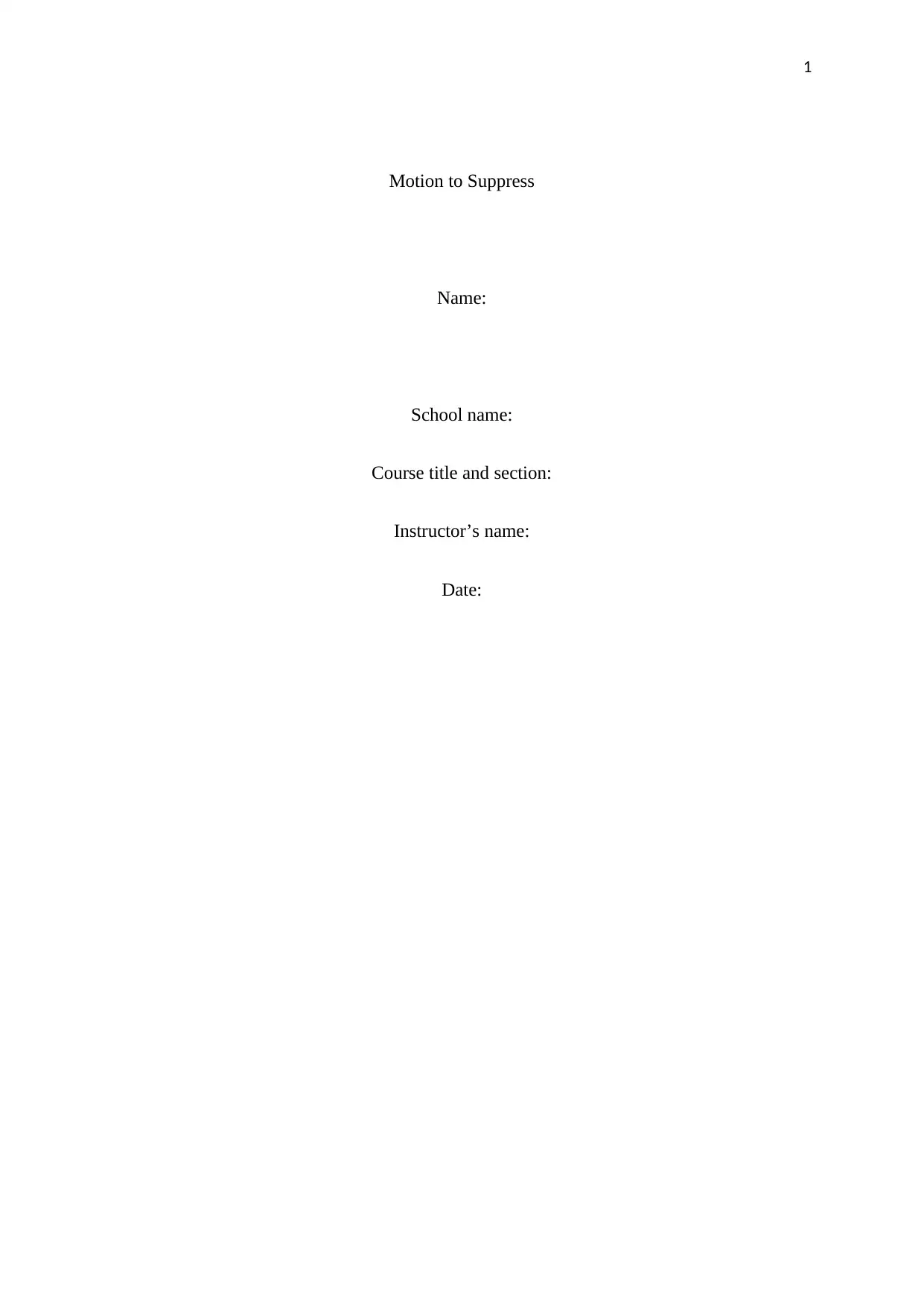
1
Motion to Suppress
Name:
School name:
Course title and section:
Instructor’s name:
Date:
Motion to Suppress
Name:
School name:
Course title and section:
Instructor’s name:
Date:
Paraphrase This Document
Need a fresh take? Get an instant paraphrase of this document with our AI Paraphraser
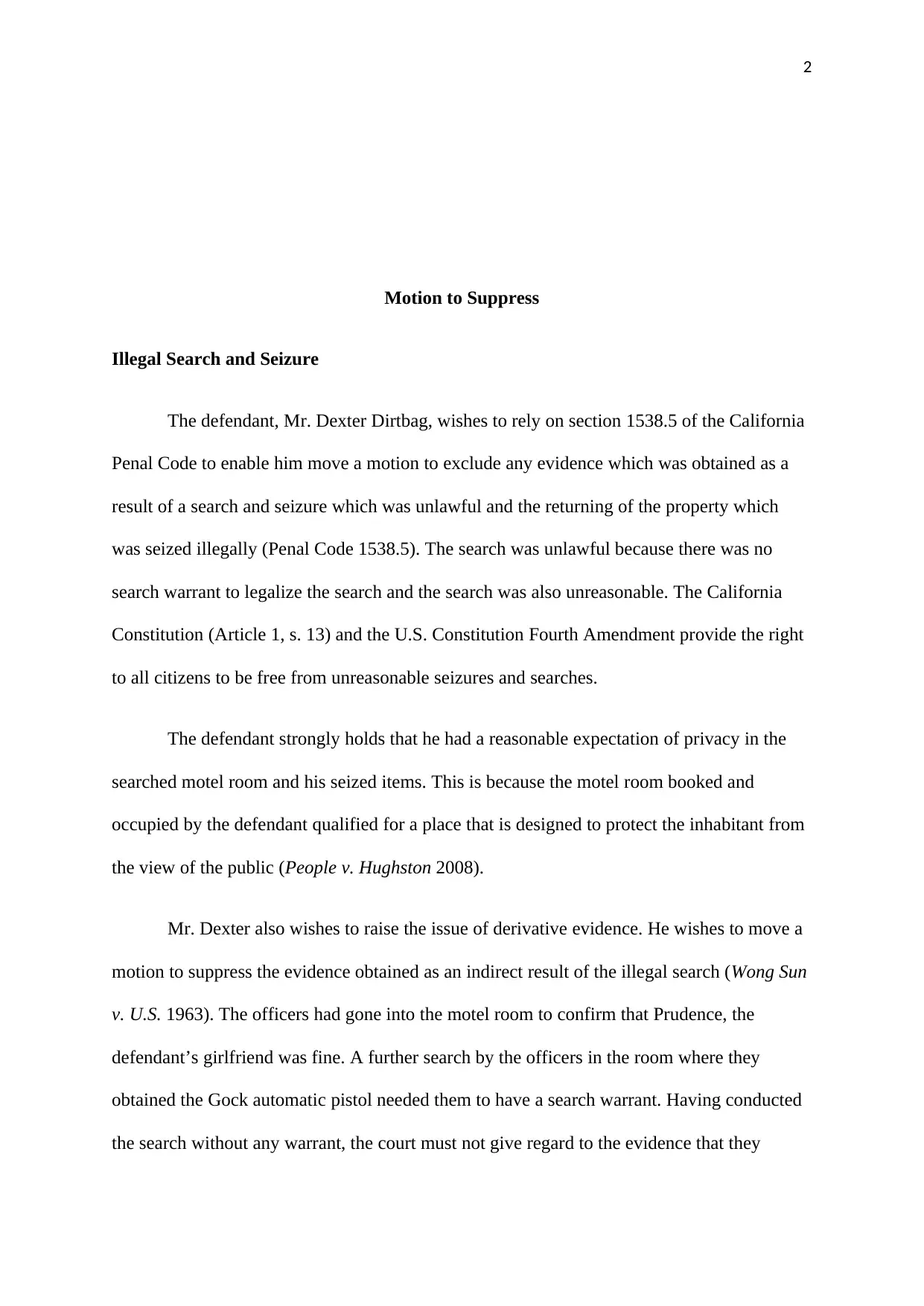
2
Motion to Suppress
Illegal Search and Seizure
The defendant, Mr. Dexter Dirtbag, wishes to rely on section 1538.5 of the California
Penal Code to enable him move a motion to exclude any evidence which was obtained as a
result of a search and seizure which was unlawful and the returning of the property which
was seized illegally (Penal Code 1538.5). The search was unlawful because there was no
search warrant to legalize the search and the search was also unreasonable. The California
Constitution (Article 1, s. 13) and the U.S. Constitution Fourth Amendment provide the right
to all citizens to be free from unreasonable seizures and searches.
The defendant strongly holds that he had a reasonable expectation of privacy in the
searched motel room and his seized items. This is because the motel room booked and
occupied by the defendant qualified for a place that is designed to protect the inhabitant from
the view of the public (People v. Hughston 2008).
Mr. Dexter also wishes to raise the issue of derivative evidence. He wishes to move a
motion to suppress the evidence obtained as an indirect result of the illegal search (Wong Sun
v. U.S. 1963). The officers had gone into the motel room to confirm that Prudence, the
defendant’s girlfriend was fine. A further search by the officers in the room where they
obtained the Gock automatic pistol needed them to have a search warrant. Having conducted
the search without any warrant, the court must not give regard to the evidence that they
Motion to Suppress
Illegal Search and Seizure
The defendant, Mr. Dexter Dirtbag, wishes to rely on section 1538.5 of the California
Penal Code to enable him move a motion to exclude any evidence which was obtained as a
result of a search and seizure which was unlawful and the returning of the property which
was seized illegally (Penal Code 1538.5). The search was unlawful because there was no
search warrant to legalize the search and the search was also unreasonable. The California
Constitution (Article 1, s. 13) and the U.S. Constitution Fourth Amendment provide the right
to all citizens to be free from unreasonable seizures and searches.
The defendant strongly holds that he had a reasonable expectation of privacy in the
searched motel room and his seized items. This is because the motel room booked and
occupied by the defendant qualified for a place that is designed to protect the inhabitant from
the view of the public (People v. Hughston 2008).
Mr. Dexter also wishes to raise the issue of derivative evidence. He wishes to move a
motion to suppress the evidence obtained as an indirect result of the illegal search (Wong Sun
v. U.S. 1963). The officers had gone into the motel room to confirm that Prudence, the
defendant’s girlfriend was fine. A further search by the officers in the room where they
obtained the Gock automatic pistol needed them to have a search warrant. Having conducted
the search without any warrant, the court must not give regard to the evidence that they
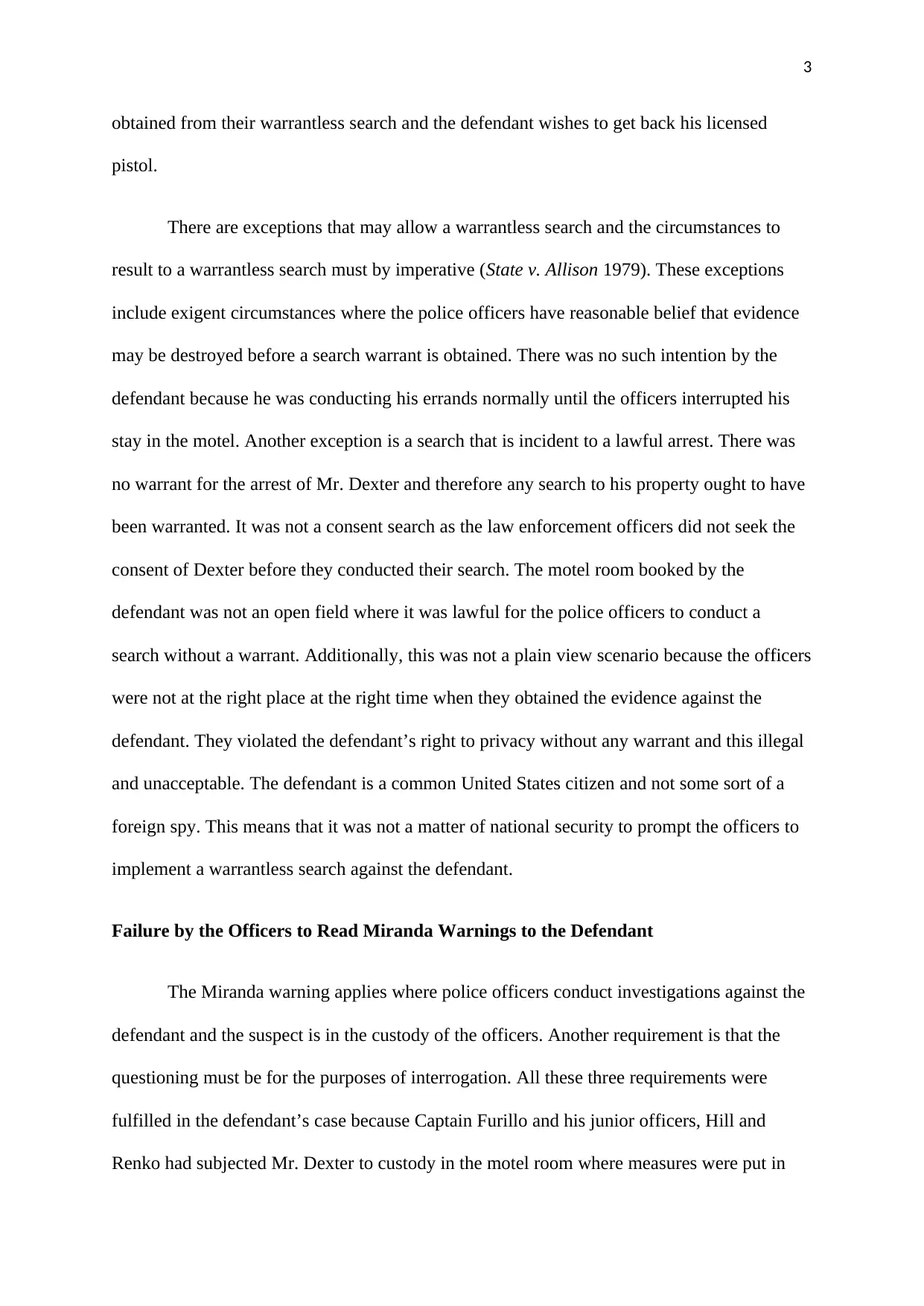
3
obtained from their warrantless search and the defendant wishes to get back his licensed
pistol.
There are exceptions that may allow a warrantless search and the circumstances to
result to a warrantless search must by imperative (State v. Allison 1979). These exceptions
include exigent circumstances where the police officers have reasonable belief that evidence
may be destroyed before a search warrant is obtained. There was no such intention by the
defendant because he was conducting his errands normally until the officers interrupted his
stay in the motel. Another exception is a search that is incident to a lawful arrest. There was
no warrant for the arrest of Mr. Dexter and therefore any search to his property ought to have
been warranted. It was not a consent search as the law enforcement officers did not seek the
consent of Dexter before they conducted their search. The motel room booked by the
defendant was not an open field where it was lawful for the police officers to conduct a
search without a warrant. Additionally, this was not a plain view scenario because the officers
were not at the right place at the right time when they obtained the evidence against the
defendant. They violated the defendant’s right to privacy without any warrant and this illegal
and unacceptable. The defendant is a common United States citizen and not some sort of a
foreign spy. This means that it was not a matter of national security to prompt the officers to
implement a warrantless search against the defendant.
Failure by the Officers to Read Miranda Warnings to the Defendant
The Miranda warning applies where police officers conduct investigations against the
defendant and the suspect is in the custody of the officers. Another requirement is that the
questioning must be for the purposes of interrogation. All these three requirements were
fulfilled in the defendant’s case because Captain Furillo and his junior officers, Hill and
Renko had subjected Mr. Dexter to custody in the motel room where measures were put in
obtained from their warrantless search and the defendant wishes to get back his licensed
pistol.
There are exceptions that may allow a warrantless search and the circumstances to
result to a warrantless search must by imperative (State v. Allison 1979). These exceptions
include exigent circumstances where the police officers have reasonable belief that evidence
may be destroyed before a search warrant is obtained. There was no such intention by the
defendant because he was conducting his errands normally until the officers interrupted his
stay in the motel. Another exception is a search that is incident to a lawful arrest. There was
no warrant for the arrest of Mr. Dexter and therefore any search to his property ought to have
been warranted. It was not a consent search as the law enforcement officers did not seek the
consent of Dexter before they conducted their search. The motel room booked by the
defendant was not an open field where it was lawful for the police officers to conduct a
search without a warrant. Additionally, this was not a plain view scenario because the officers
were not at the right place at the right time when they obtained the evidence against the
defendant. They violated the defendant’s right to privacy without any warrant and this illegal
and unacceptable. The defendant is a common United States citizen and not some sort of a
foreign spy. This means that it was not a matter of national security to prompt the officers to
implement a warrantless search against the defendant.
Failure by the Officers to Read Miranda Warnings to the Defendant
The Miranda warning applies where police officers conduct investigations against the
defendant and the suspect is in the custody of the officers. Another requirement is that the
questioning must be for the purposes of interrogation. All these three requirements were
fulfilled in the defendant’s case because Captain Furillo and his junior officers, Hill and
Renko had subjected Mr. Dexter to custody in the motel room where measures were put in
⊘ This is a preview!⊘
Do you want full access?
Subscribe today to unlock all pages.

Trusted by 1+ million students worldwide
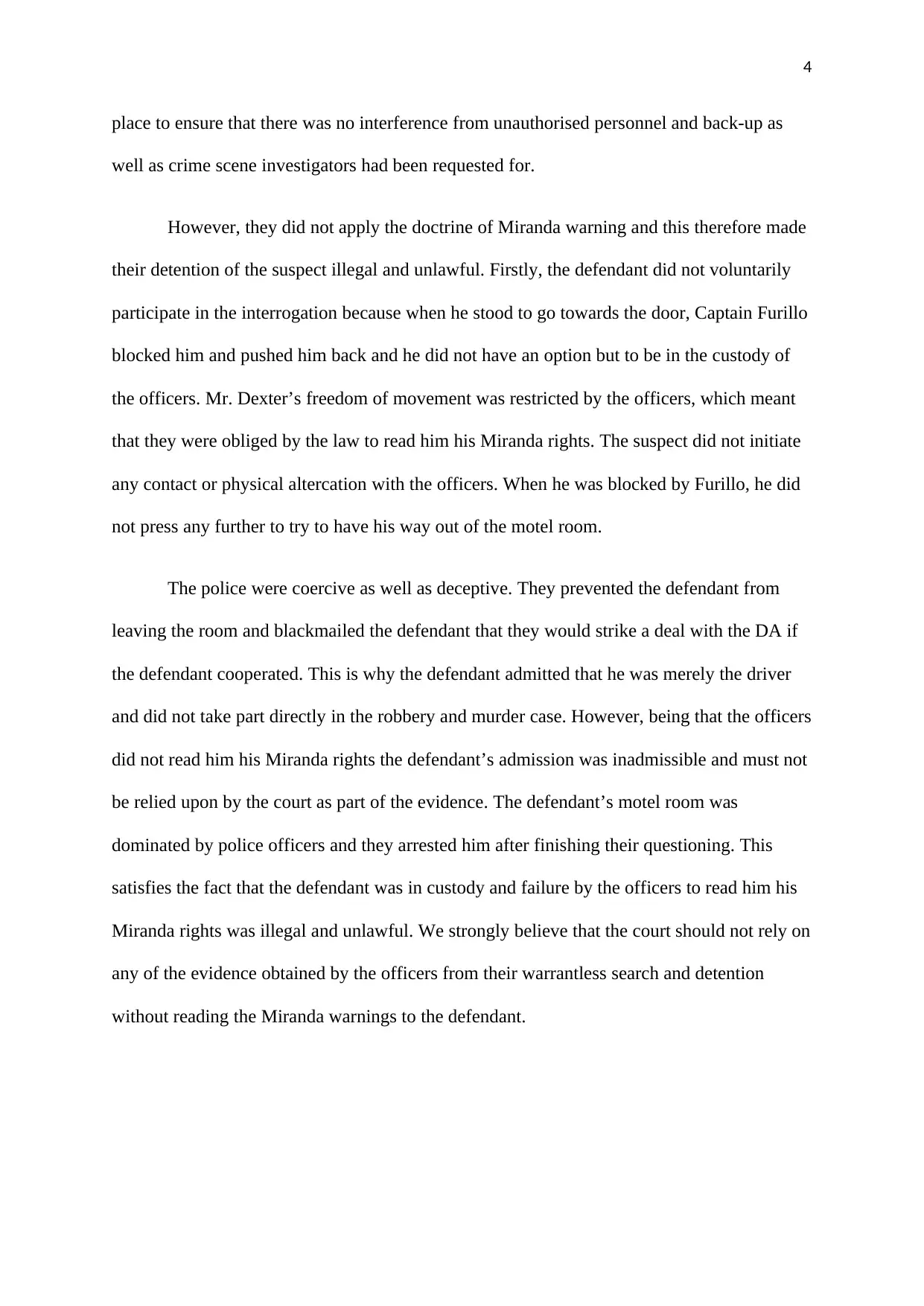
4
place to ensure that there was no interference from unauthorised personnel and back-up as
well as crime scene investigators had been requested for.
However, they did not apply the doctrine of Miranda warning and this therefore made
their detention of the suspect illegal and unlawful. Firstly, the defendant did not voluntarily
participate in the interrogation because when he stood to go towards the door, Captain Furillo
blocked him and pushed him back and he did not have an option but to be in the custody of
the officers. Mr. Dexter’s freedom of movement was restricted by the officers, which meant
that they were obliged by the law to read him his Miranda rights. The suspect did not initiate
any contact or physical altercation with the officers. When he was blocked by Furillo, he did
not press any further to try to have his way out of the motel room.
The police were coercive as well as deceptive. They prevented the defendant from
leaving the room and blackmailed the defendant that they would strike a deal with the DA if
the defendant cooperated. This is why the defendant admitted that he was merely the driver
and did not take part directly in the robbery and murder case. However, being that the officers
did not read him his Miranda rights the defendant’s admission was inadmissible and must not
be relied upon by the court as part of the evidence. The defendant’s motel room was
dominated by police officers and they arrested him after finishing their questioning. This
satisfies the fact that the defendant was in custody and failure by the officers to read him his
Miranda rights was illegal and unlawful. We strongly believe that the court should not rely on
any of the evidence obtained by the officers from their warrantless search and detention
without reading the Miranda warnings to the defendant.
place to ensure that there was no interference from unauthorised personnel and back-up as
well as crime scene investigators had been requested for.
However, they did not apply the doctrine of Miranda warning and this therefore made
their detention of the suspect illegal and unlawful. Firstly, the defendant did not voluntarily
participate in the interrogation because when he stood to go towards the door, Captain Furillo
blocked him and pushed him back and he did not have an option but to be in the custody of
the officers. Mr. Dexter’s freedom of movement was restricted by the officers, which meant
that they were obliged by the law to read him his Miranda rights. The suspect did not initiate
any contact or physical altercation with the officers. When he was blocked by Furillo, he did
not press any further to try to have his way out of the motel room.
The police were coercive as well as deceptive. They prevented the defendant from
leaving the room and blackmailed the defendant that they would strike a deal with the DA if
the defendant cooperated. This is why the defendant admitted that he was merely the driver
and did not take part directly in the robbery and murder case. However, being that the officers
did not read him his Miranda rights the defendant’s admission was inadmissible and must not
be relied upon by the court as part of the evidence. The defendant’s motel room was
dominated by police officers and they arrested him after finishing their questioning. This
satisfies the fact that the defendant was in custody and failure by the officers to read him his
Miranda rights was illegal and unlawful. We strongly believe that the court should not rely on
any of the evidence obtained by the officers from their warrantless search and detention
without reading the Miranda warnings to the defendant.
Paraphrase This Document
Need a fresh take? Get an instant paraphrase of this document with our AI Paraphraser
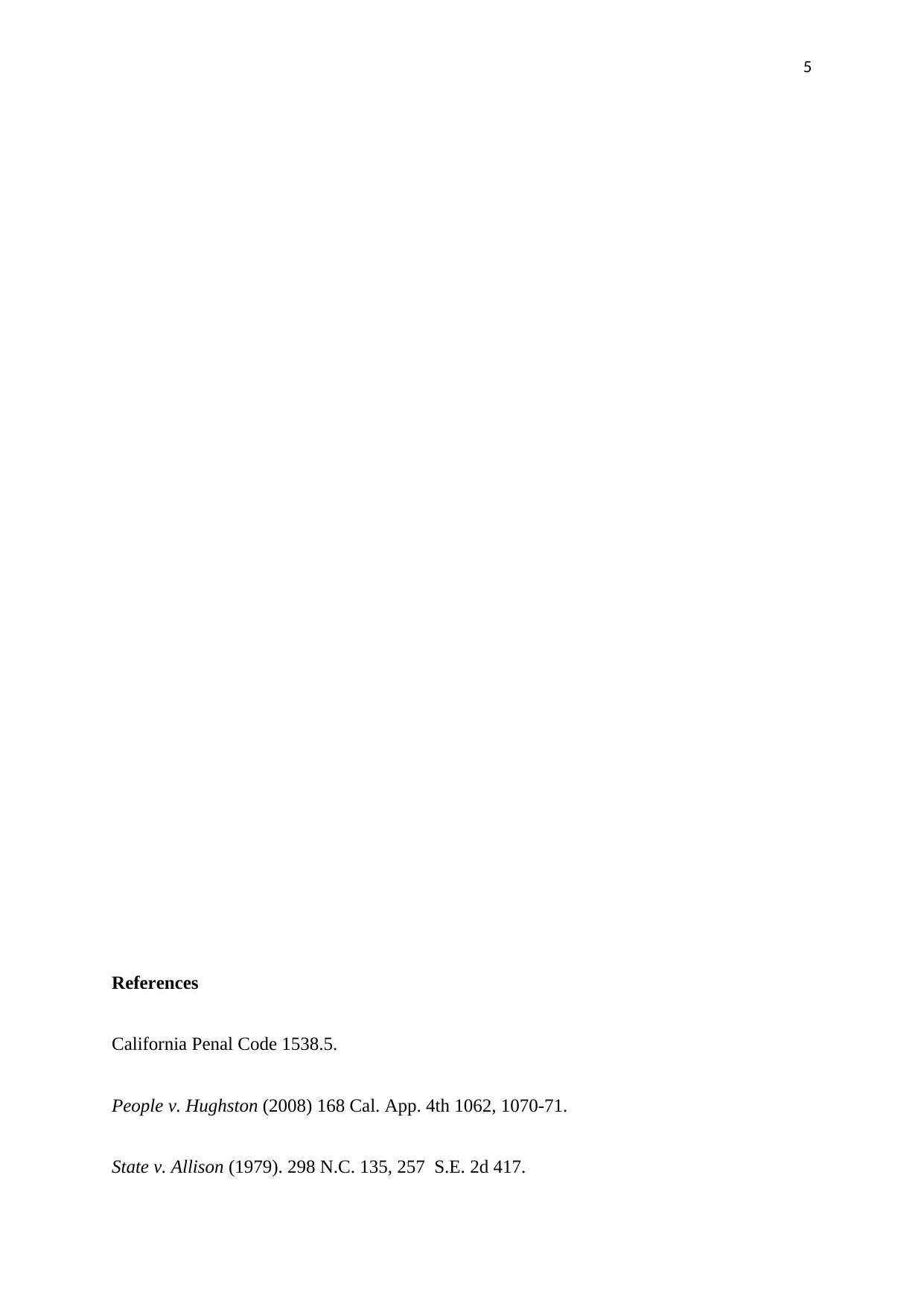
5
References
California Penal Code 1538.5.
People v. Hughston (2008) 168 Cal. App. 4th 1062, 1070-71.
State v. Allison (1979). 298 N.C. 135, 257 S.E. 2d 417.
References
California Penal Code 1538.5.
People v. Hughston (2008) 168 Cal. App. 4th 1062, 1070-71.
State v. Allison (1979). 298 N.C. 135, 257 S.E. 2d 417.
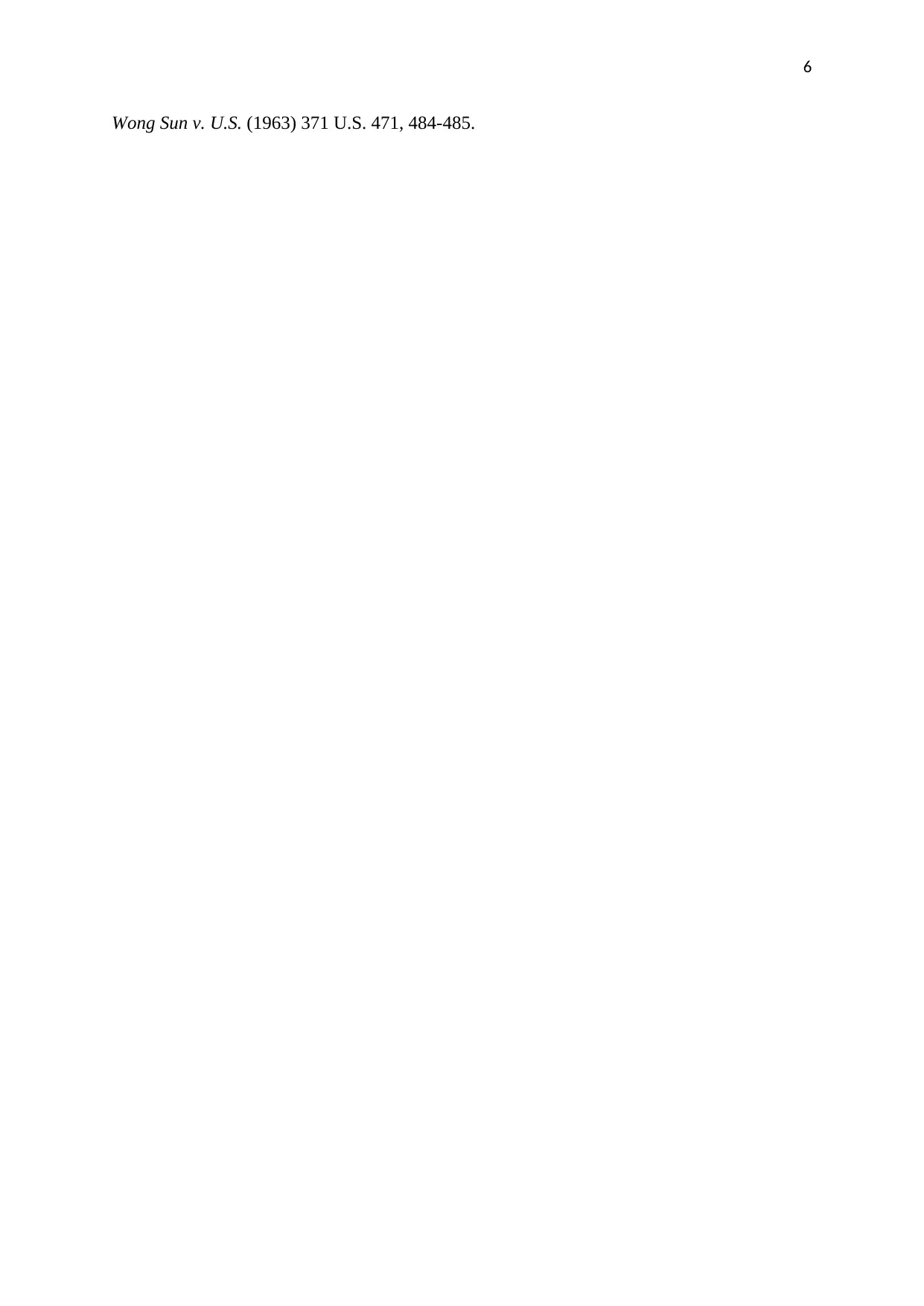
6
Wong Sun v. U.S. (1963) 371 U.S. 471, 484-485.
Wong Sun v. U.S. (1963) 371 U.S. 471, 484-485.
⊘ This is a preview!⊘
Do you want full access?
Subscribe today to unlock all pages.

Trusted by 1+ million students worldwide
1 out of 6
Your All-in-One AI-Powered Toolkit for Academic Success.
+13062052269
info@desklib.com
Available 24*7 on WhatsApp / Email
![[object Object]](/_next/static/media/star-bottom.7253800d.svg)
Unlock your academic potential
Copyright © 2020–2026 A2Z Services. All Rights Reserved. Developed and managed by ZUCOL.


